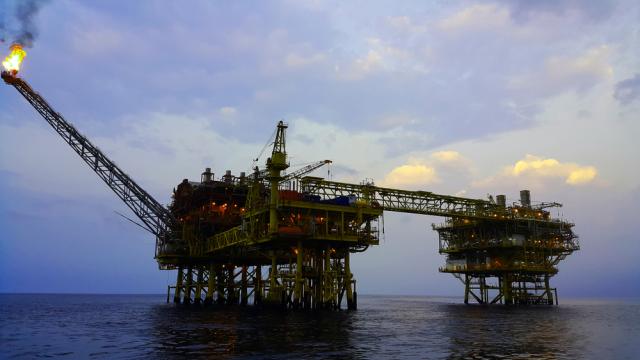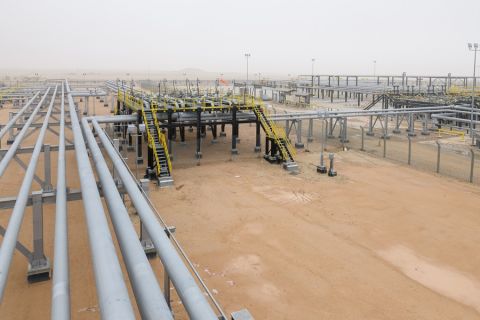
A production platform is shown offshore Myanmar. (Source: Rungrote Sommart/Shutterstock.com)
Myanmar is readying to launch a new bidding round for oil and gas concessions—both onshore and offshore—on revised production-sharing contract (PSC) norms during the second quarter.
Speaking during a recent industry meeting, the country’s electricity and energy minister, U Win Khine, said the ministry hopes to finalize the tender for 33 blocks, including 18 onshore and 15 offshore blocks, by the end of March.
The last bidding round for oil and gas blocks was held in 2014 when 16 of the 31 offered were awarded.
The new oil gas concessions, according to the minister, will be offered on the revised PSC norms which he described as “favorable” for investors. The PSC terms and conditions have been finalized by the ministry, but they await approval from the Cabinet.
Myanmar Investment Commission chairman U Thaung Tun said the government has redrafted the PSC norms with the main objective of revitalizing the exploration and development of oil and gas fields in the country.
Details of the revised PSC were not disclosed but officials maintained they would address the issues raised by local and international companies. The issues relate to higher corporate tax, commodity tax, royalty and profit share for the government.
Energy ministry officials, however, informed that the new norms would offer a liberal fiscal regime for investors, including extension of the tax holiday from three years to five years and reduction of the income tax rate from 25% to less than 20%.
“We can’t afford to be rigid with the PSCs. Our existing contracts are very old. They were based on the situation in the market 25 years ago,” the energy minister told Myanmar Times recently. “If we still stick to the current terms, investors will find it very hard to invest in Myanmar. We need to be flexible and more in tune with current oil prices and market conditions so that investors will return.”
Existing terms and conditions of the PSC, prepared by the military government, have adversely affected development of the upstream industry. Energy companies surrendered almost half of the offshore blocks awarded during the 2014 bidding round.
Companies like Shell and Reliance Industries exited awarded concessions even after they discovered oil and gas.
Investors say the existing PSC norms provide maximal benefits to the state at the expense of investors. “For instance, on top of heavy taxation on profits and royalty obligations, average government take of the revenues generated under each oil and gas PSC is as high as 77% in Myanmar,” Fitch Solutions said in a report.
This is higher than the rate in the upstream markets in Australasia.
Wood Mackenzie states the Myanmar government does not currently share the risk in exploration and development costs.
Myanmar, which transformed from a net oil exporter to net importer due to the economic sanctions during the military rule till 2011, is trying to attract investments and technology from the global investors to extract hydrocarbon reserves from offshore and onshore basins. It imports oil of about 50,000 barrels per day (bbl/d) to meet the demand in absence of new production sources.
The Southeast Asian state has so far been successful in developing only four major fields—Yadana, Shwe, Zawtika and Yetagon— along with some small fields onshore.
The current production level of about 12,000 bbl/d of crude oil and 1,750 million standard cubic feet per day of natural gas is considered insignificant, given the large size of the potential hydrocarbon resources in the country, which are estimated at between 60 trillion cubic feet (Tcf) and 72 Tcf of gas plus and 540 MMbbl of crude oil.
The energy ministry says the size of the hydrocarbon reserves could be higher, considering about 70% of the country’s sedimentary basins have not been mapped.
Myanmar is considered to be one of the last underexplored frontiers in the global oil and gas industry.
The proposed bidding round is expected to attract the global investors amid higher oil and gas demand in Myanmar and gas pipeline linkage with neighboring China and Thailand.
Some of the regional companies, such as PTTEP (Thailand) and ONGC Ltd. (India), have expressed interest in participating in the upcoming bid round.
Recommended Reading
What's Affecting Oil Prices This Week? (April 8, 2024)
2024-04-08 - Stratas Advisors says geopolitics are providing a boost for oil prices as conflicts escalate–and while crude oil and oil products continue to flow, the possibility of disruption is increasing.
What's Affecting Oil Prices This Week? (March 11, 2024)
2024-03-11 - Stratas Advisors expects oil prices to move higher in the middle of the year, but for the upcoming week, there is no impetus for prices to raise.
What's Affecting Oil Prices This Week? (March 18, 2024)
2024-03-18 - On average, Stratas Advisors predicts that supply will be at a deficit of 840,000 bbl/d during 2024.
Paisie: Crude Prices Rising Faster Than Expected
2024-04-19 - Supply cuts by OPEC+, tensions in Ukraine and Gaza drive the increases.
Paisie: Economics Edge Out Geopolitics
2024-02-01 - Weakening economic outlooks overpower geopolitical risks in oil pricing.





